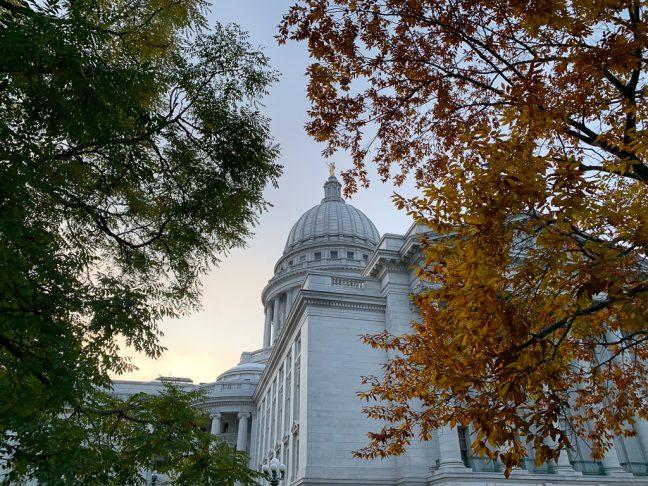Gov. Tony Evers, in his State of the State address, announced a new commission for creating a nonpartisan map of Wisconsin, infamously regarded as the most gerrymandered state.
To brief those unfamiliar with this concept, gerrymandering is the practice of separating the state into districts strategically so as to fabricate an electoral outcome, regardless of the intention of the voters. This is done by bounding voters of a certain party in a few districts then creating many more districts that have scattered and minimal support of that party. This gives the party in control a high number of narrower victories and the victim party a low number of overwhelming victories.
Coined in 1812, gerrymandering got its name after Massachusetts Governor Elbridge Gerry drew districts that disadvantaged the Federalist Party, the rival party of the Democratic-Republicans, the party to which he belonged, with one district that famously looked like a salamander.
Created and practiced as a political ploy for parties to hold on to power, the courts have stayed away from ruling on gerrymandering as they have seen it as more of a political issue rather than a constitutional one. The courts have only stepped in when the redistricting was drawn to disadvantage racial minorities in the states, and only after quite some time and advocacy.
In 2011, the Wisconsin government was controlled by the Republican party and the lack of opposition allowed a heavily gerrymandered redistricting plan to pass. The Republican legislators even took oaths of secrecy to not speak about the redistricting to anyone publicly.
Congress’ inability to focus on anything besides political affiliation threatens national security
Fast forward, the case of Wisconsin gerrymandered districts ended up at the United States Supreme Court in Gill v. Whitford (2018), where the Justices unanimously agreed to dismiss the case on a narrow legal complication with the case. Justice Elena Kagan wrote in a concurring opinion that the Court is bound to rule on a political gerrymandering case eventually.
But, in the absence of a constitutional ruling from the Supreme Court, the Republican party is free to claim — and has already done so — the districts they are drawing are perfectly constitutional and they have the intention of continuing down the same path. It is evident when a party does not mount a defense other than a denial of wrongdoing or propose an alternative solution to a certain problem, they are most likely causing it.
State Sen. Jon Erpenbach, D-West Point, wrote on the subject, stating voters should be able to choose their representatives, not the other way around. He is absolutely right. Gerrymandering districts in Wisconsin dilutes the salience of someone’s vote in a particular district so it matters less when electing state legislators.
As more Democratic voters live in urban areas like Milwaukee and Madison and more Republican voters live in rural areas, these districts are designed to pack as many Democratic voters in the fewest amount of districts possible. Then, more districts are created in areas with very few Democratic voters.
Point Counterpoint: Gov. Evers’ push for political redistricting is new form of gerrymandering
So, more Republicans get elected though that does not accurately reflect the political demographics of Wisconsin. This is why every state-wide office in 2018 elected a Democratic candidate but there is still an overwhelming Republican majority in the legislature.
Republicans gerrymandered Wisconsin districts to end up electing a Republican majority, which then could be used to produce another gerrymandered map. It is an endless cycle that has to be broken so the interests of Wisconsinites can be represented as we wish to elect them to be, instead of politicians deciding for us.
Gerrymandering is the cancer of democracy. So long as gerrymandering exists, democracy suffocates and the suffocation of democracy results in a lost trust in government and misrepresentation of the people’s interests.
This is not an issue only Democrats care about. A recent Marquette University Law poll uncovered 72% of Wisconsinites supported a nonpartisan redistricting plan, encompassing a majority of Democrats, Independents, and even Republicans. 50 of Wisconsin’s 72 counties also support a nonpartisan solution.
The governor’s nonpartisan redistricting commission does not have any legislative pull, but if the case is taken to court on account of a likely partisan impasse there is a possibility the nonpartisan maps could be favored to whatever the legislature comes up with.
Point Counterpoint: Gov. Evers’ political redistricting will give power back to masses
It is also worth noting obtaining a truly nonpartisan map is near impossible. The feasibility of creating a map with a projected outcome that reflects the voting in a state-wide or federal election is unlikely at best. But, that doesn’t mean there isn’t such a thing as a non-gerrymandered map.
Because district maps will not be redrawn until 2021, this issue may not affect the 2020 election in Wisconsin, but with an issue with as much bipartisan support as this, it could be something to look out for among candidates. How 2020 candidates for the Wisconsin State Senate and State Assembly address this issue can reveal a lot about how much they value democratic ideals.
State governments deserve more attention than the federal government because they have a much bigger hand in our everyday lives. Evers proposed a nonpartisan solution to this problem and will have to fight the conservative majority in the legislature to implement a fair plan. It is our job to turn out and vote for a candidate who supports the restoration of democracy in Wisconsin.
Kaitlin Kons ([email protected]) is a sophomore studying political science and public policy.




















